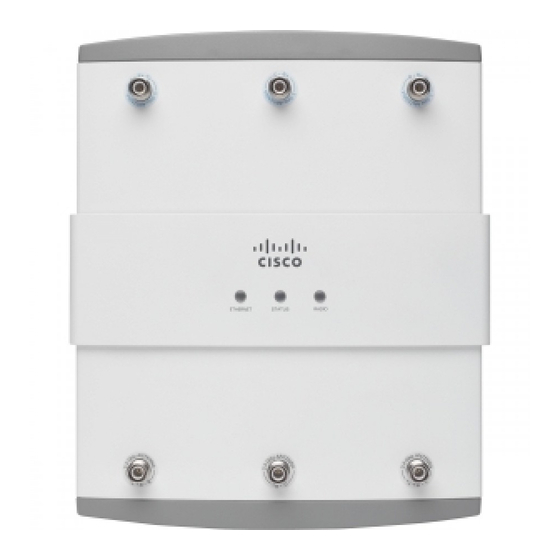Cisco Aironet 1250 Series Ficha de dados - Página 3
Procurar online ou descarregar pdf Ficha de dados para Hardware de rede Cisco Aironet 1250 Series. Cisco Aironet 1250 Series 14 páginas. Aironet 1250 series
Também para Cisco Aironet 1250 Series: Manual de configuração (40 páginas), Manual (37 páginas), Manual de instalação do hardware (10 páginas)

All contents are Copyright © 1992–2007 Cisco Systems, Inc. All rights reserved. This document is Cisco Public Information.
RF Management
Cisco incorporates unique capabilities within its wireless solution that address the operational
challenges of deploying business wireless networks. At the heart of these capabilities are
intelligent Radio Resource Management (RRM) algorithms designed to consistently fine-tune
WLAN parameters to best meet ongoing performance requirements. RRM allows the Cisco Unified
Wireless Network to continuously analyze the existing RF environment and automatically adjust
access point power and channel settings to help mitigate such things as co-channel interference
and signal coverage problems. Unlike conventional 802.11a/b/g products, the Cisco Aironet 1250
Series uses multiple-input multiple-output (MIMO) technology to take advantage of the effects of
RF multipath propagation in order to improve the reliability and predictability of the wireless signal.
The Cisco Aironet 1250 Series supports the latest U.S. and European requirements for Dynamic
Frequency Selection (DFS), ensuring the access point accurately detects radar events and makes
full use of the available 5-GHz spectrum. In addition, the Cisco Aironet 1250 Series supports a
Software Defined Radio (SDR) enabling it to be upgraded in the field to support new frequencies
and power levels as they are approved for use. These RF management capabilities increase
system capacity, perform automated self-healing to compensate for RF dead zones and access
point failures, and provide a comprehensive way to manage one of your most precious assets,
your corporate spectrum.
Deployment Scenarios
The Cisco Aironet 1250 Series with support for the 802.11n draft 2.0 standard is ideal for a variety
of deployment scenarios across many industries. The improved throughput, reliability, and
predictability of an 802.11n network meet the requirements that many companies have for moving
towards a truly mobile enterprise. Cisco's next-generation wireless technology is especially
beneficial for environments with the following characteristics:
Challenging RF environments (for example, manufacturing plants, warehouses, clinical
●
environments)
Bandwidth-intensive applications (for example, digital imaging, file transfers, network
●
backup)
Real-time, latency-sensitive applications including voice and video
●
Environments that need to support existing 802.11a/b/g and new 802.11n wireless clients
●
Designed for critical business environments and installations that require antenna versatility, the
Cisco Aironet 1250 Series features antenna connectors for improved coverage and aesthetically
pleasing installation options. The UL2043 rating of the Cisco Aironet 1250 Series allows the
access points to be placed above the ceiling tile in plenum areas regulated by municipal fire codes
or suspended from drop ceilings.
Features and Benefits
Table 1 lists the features and benefits of Cisco Aironet 1250 Series Access Points.
Data Sheet
Page 3 of 13
